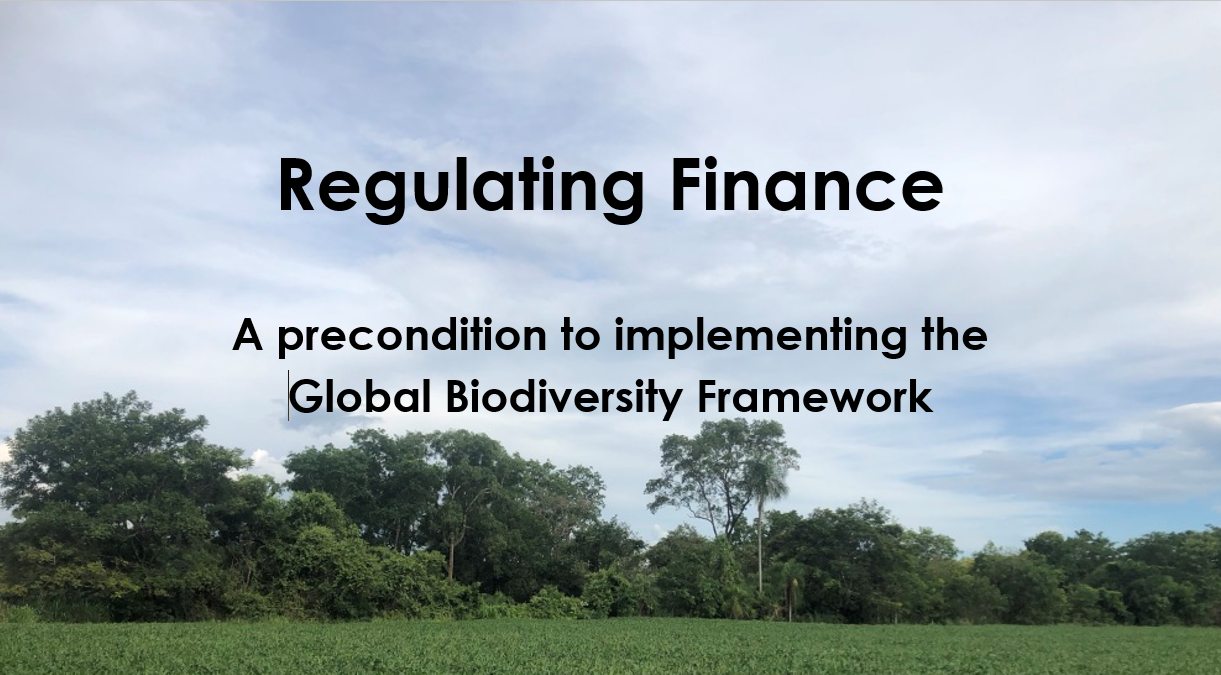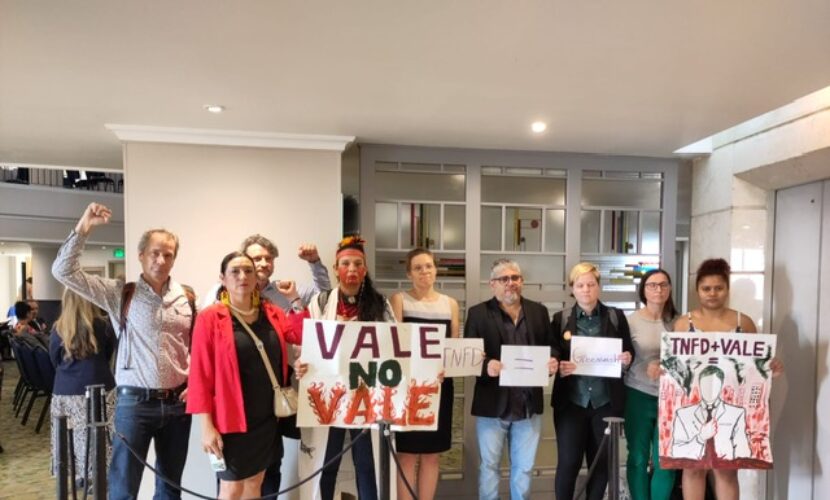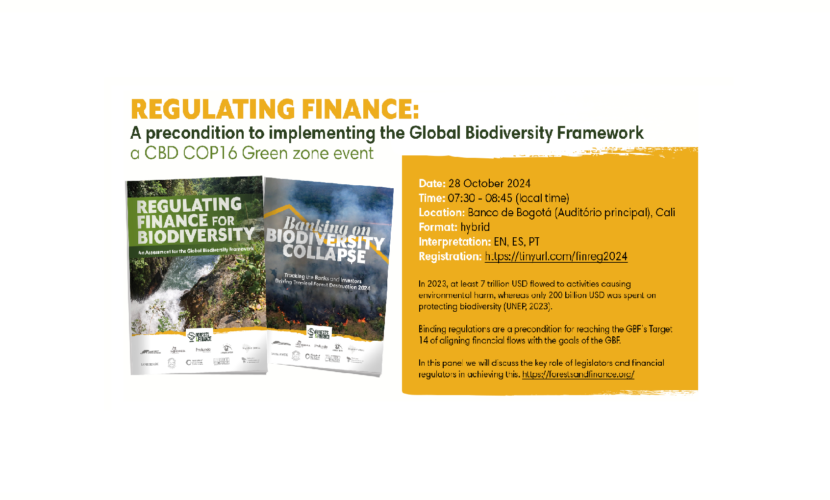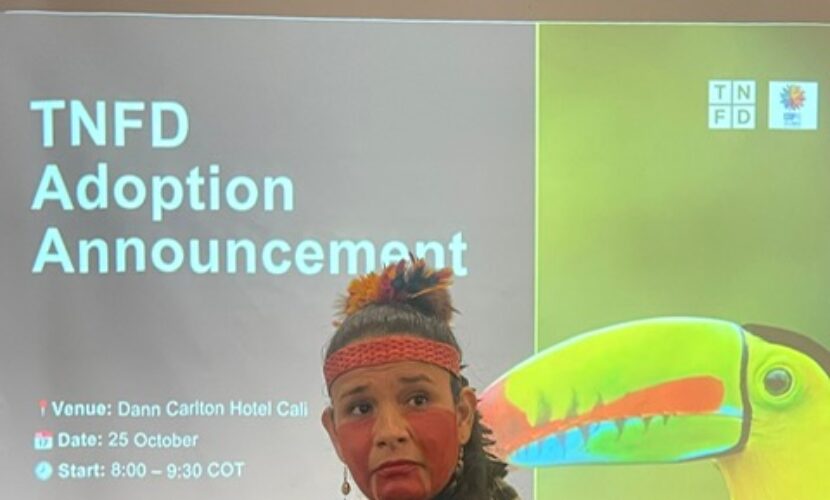News
Regulating Finance – A precondition to implementing the Global Biodiversity Framework

In December 2022, almost all Governments on the planet committed formally to halt biodiversity loss by 2030 by adopting the Global Biodiversity Framework (GBF). However, as concluded by the State of Finance for Nature report published by the UN in December 2023, these governments are yet to put their money where their mouth is. The report concluded that private financial flows to biodiversity conservation are less than 1 percent of private financial flows spent on activities that harm biodiversity, while harmful public financial flows are 10 times greater than public investments in conservation. The 2023 Banking on Biodiversity Collapse report, for example, revealed that at least $307 billion in credit had been directed to the main tropical forest-risk sectors from 2016 to September 2023. In total, public and private financial flows causing biodiversity loss and associated environmental harm added up to 7 trillion USD in 2023, whereas only 200 billion USD was spent on conserving or restoring biodiversity (UNEP, 2023). It is clear that a binding commitment to eliminate these harmful financial flows is a precondition for reaching the GBF’s objective of halting and reversing biodiversity loss by 2030.
For that reason, governments committed to progressively align all financial flows with the GBF (GBF target 14). They also committed to identify and eliminate subsidies and other perverse incentives that might trigger biodiversity loss (GBF target 18). Moreover, they agreed on a target to take legal, administrative or policy measures to ensure that financial institutions transparently disclose their impacts on biodiversity … in order to progressively reduce negative impacts (GBF target 15). The draft updated resource mobilization strategy that will be discussed at the 4th meeting of the CBD Subsidiary Body on Implementation (SBI) acknowledges the need that public and private financial flows need to be aligned with the GBF. However, it also expresses support for the Taskforce on Nature-related Finance Disclosures (TNFD) as a tool to achieve this, despite the fact that voluntary initiatives like this are not aligned at all with the GBF, and have proven to fail in the past.
TNFD provides only voluntary reporting guidelines for financial institutions. This is not in line with GBF target 15, which mandates governments to ensure that impacts are not only reported on, but also addressed. To make things worse, TNFD’s baseline recommendations do not even expect businesses to disclose their full negative impact on biodiversity. The framework itself requires disclosure of information that is financially “material”, which means risks will mainly be reported if they might impact on the financial interests of -potential- investors in the company – unless national laws require otherwise. In most cases the negative impacts of biodiversity loss are public. They affect, in an often highly gendered manner, the Indigenous Peoples and the local communities that depend on forests or other ecosystems for their livelihood, and society as a whole. Moreover, a 2021 World Bank report highlighted that low and middle low income countries will suffer 10 to 15 times larger economic impacts from biodiversity loss than high income countries. The wealthy companies causing the harm are often the last to suffer from the impacts of the damage they cause.
Even investors are not benefiting from TNFD guidance, as companies are not even obliged, for example, to report if they are facing serious complaints over biodiversity destruction or human rights violations, or even to disclose where they are operating or buying from. It allows investors to determine freely which data they want to disclose and through which methodology such data are gathered, which makes it impossible for independent auditors or other actors to verify whether these data are correct.
Other corporate initiatives have proven to be ineffective and out of step with CBD and GBF agreements as well. An analysis of the forest-risk policies of more than 100 financial institutions concluded that despite some marginal improvements since 2016 “vague language, unclear timeframes, and other loopholes persisted, leading to continued facilitation of human rights violations and deforestation.” (BOBC, 2023). Meanwhile, several countries like France, Brazil, China, Malaysia and Indonesia, and the EU, have already established regulatory frameworks to align their financial sectors with the GBF, or are in process of developing such regulations.
The CBD is a legally binding instrument, and it has become clear that an approach that embraces corporate-driven voluntary initiatives will not enable Governments to reach the targets that were set under the GBF to ensure compliance with the Convention. Governments and financial regulators must adopt strong regulations to ensure that the financing of biodiversity collapse is halted, and that public and private resources are channeled to finance a gender just and truly sustainable transition. As a very first step, Governments should clearly indicate in the updated National Biodiversity Strategies and Action Plans they are supposed to publish before the next CBD Summit in October 2024 what regulatory steps they are planning to make to prohibit the allocation of public or private capital to corporations and sectors that drive ecosystem destruction, so as to align all financial flows with the GBF objective to halt and reverse biodiversity loss by 2030.
Download the briefer in English, Spanish, French, Portuguese or Indonesian





